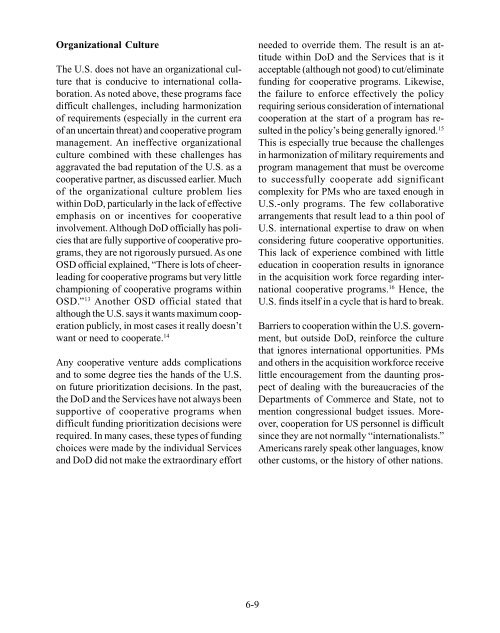Transatlantic Armaments Cooperation - Federation of American ...
Transatlantic Armaments Cooperation - Federation of American ...
Transatlantic Armaments Cooperation - Federation of American ...
You also want an ePaper? Increase the reach of your titles
YUMPU automatically turns print PDFs into web optimized ePapers that Google loves.
Organizational Culture<br />
The U.S. does not have an organizational culture<br />
that is conducive to international collaboration.<br />
As noted above, these programs face<br />
difficult challenges, including harmonization<br />
<strong>of</strong> requirements (especially in the current era<br />
<strong>of</strong> an uncertain threat) and cooperative program<br />
management. An ineffective organizational<br />
culture combined with these challenges has<br />
aggravated the bad reputation <strong>of</strong> the U.S. as a<br />
cooperative partner, as discussed earlier. Much<br />
<strong>of</strong> the organizational culture problem lies<br />
within DoD, particularly in the lack <strong>of</strong> effective<br />
emphasis on or incentives for cooperative<br />
involvement. Although DoD <strong>of</strong>ficially has policies<br />
that are fully supportive <strong>of</strong> cooperative programs,<br />
they are not rigorously pursued. As one<br />
OSD <strong>of</strong>ficial explained, “There is lots <strong>of</strong> cheerleading<br />
for cooperative programs but very little<br />
championing <strong>of</strong> cooperative programs within<br />
OSD.” 13 Another OSD <strong>of</strong>ficial stated that<br />
although the U.S. says it wants maximum cooperation<br />
publicly, in most cases it really doesn’t<br />
want or need to cooperate. 14<br />
Any cooperative venture adds complications<br />
and to some degree ties the hands <strong>of</strong> the U.S.<br />
on future prioritization decisions. In the past,<br />
the DoD and the Services have not always been<br />
supportive <strong>of</strong> cooperative programs when<br />
difficult funding prioritization decisions were<br />
required. In many cases, these types <strong>of</strong> funding<br />
choices were made by the individual Services<br />
and DoD did not make the extraordinary effort<br />
6-9<br />
needed to override them. The result is an attitude<br />
within DoD and the Services that is it<br />
acceptable (although not good) to cut/eliminate<br />
funding for cooperative programs. Likewise,<br />
the failure to enforce effectively the policy<br />
requiring serious consideration <strong>of</strong> international<br />
cooperation at the start <strong>of</strong> a program has resulted<br />
in the policy’s being generally ignored. 15<br />
This is especially true because the challenges<br />
in harmonization <strong>of</strong> military requirements and<br />
program management that must be overcome<br />
to successfully cooperate add significant<br />
complexity for PMs who are taxed enough in<br />
U.S.-only programs. The few collaborative<br />
arrangements that result lead to a thin pool <strong>of</strong><br />
U.S. international expertise to draw on when<br />
considering future cooperative opportunities.<br />
This lack <strong>of</strong> experience combined with little<br />
education in cooperation results in ignorance<br />
in the acquisition work force regarding international<br />
cooperative programs. 16 Hence, the<br />
U.S. finds itself in a cycle that is hard to break.<br />
Barriers to cooperation within the U.S. government,<br />
but outside DoD, reinforce the culture<br />
that ignores international opportunities. PMs<br />
and others in the acquisition workforce receive<br />
little encouragement from the daunting prospect<br />
<strong>of</strong> dealing with the bureaucracies <strong>of</strong> the<br />
Departments <strong>of</strong> Commerce and State, not to<br />
mention congressional budget issues. Moreover,<br />
cooperation for US personnel is difficult<br />
since they are not normally “internationalists.”<br />
<strong>American</strong>s rarely speak other languages, know<br />
other customs, or the history <strong>of</strong> other nations.
















